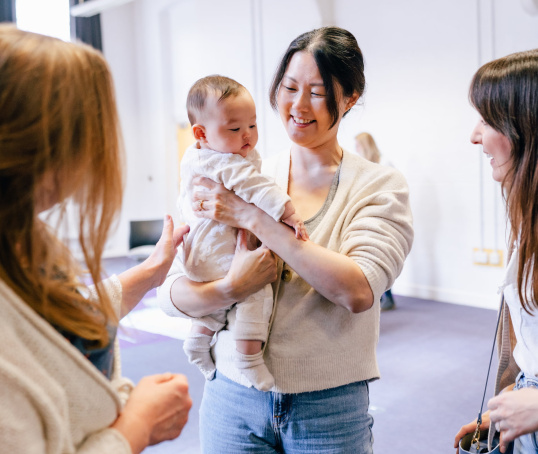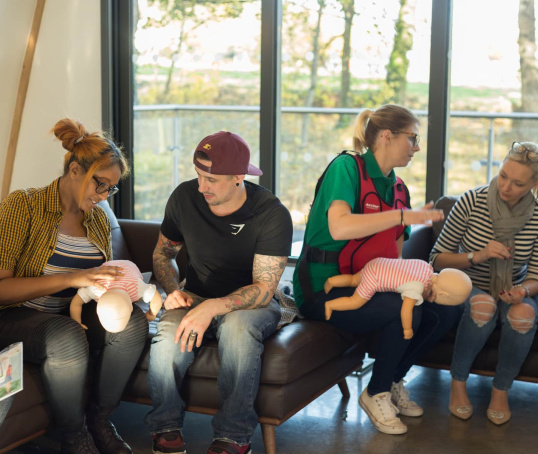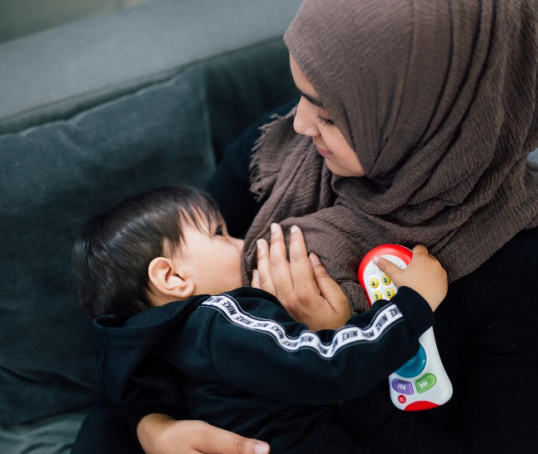It’s frustrating when you think you’ve finally settled your baby only for them to start crying as soon as you put them down. But why and what can you do?
Your baby’s tears come at the end of the day for lots of reasons. Luckily, you’ll find plenty of different techniques like those we mention below to help you and your baby have happy, peaceful bedtimes without upset.
Separation
Babies love to be held, touched and reassured that you’re there, so settling in a cot on their own can often be difficult for them. Your baby’s missing your touch and attention, and they’re letting you know about it (NHS, 2019).
From their very first hours of life, babies will cry when separated from their mothers. Somewhere between around seven or eight months and just over one year, they also often experience separation anxiety (NHS, 2018). So don’t worry, it’s a developmental phase.
Separation anxiety is a natural phase of your baby’s physiological development and, although it sounds distressing, it is entirely normal (NHS, 2018). They’re also developing object permanence, so they can recognise that people and things exist even if they can’t see them (peek-a-boo, anyone?). Put together, it’s no wonder they become upset when you try to put them down and leave the room.
What you can do
Many parents find that having a consistent bedtime routine provides some structure to their evening, and there is some evidence that babies may sleep longer at night if a bedtime routine is started before 12 weeks old (St James-Roberts, 2012; Reuter et al, 2020).
Simple steps like bathing your baby, putting on their nightwear, reading a story and kissing them goodnight all help them feel calm and ready to sleep. You might want to include a lullaby or massage – whatever works best for you, as long as it’s peaceful, calming and consistent.
You might want to do what seems right at the time for your baby, as one mum mentioned:
‘I didn't really go for a routine until 6 months, and then I varied it to work with what the baby needed at every new phase.’
Get them used to their room and crib
If your baby’s been with grown-ups all day, it’s not surprising that being in a bed or room on their own at night can feel tough. Get your baby used to spending time in their cot during the day. Make it more familiar by playing with them while they’re in their cot and putting a few of their favourite toys in with them in the day (not while they’re sleeping).
Some parents try to recreate the womb environment, such as using a cradle with a rocking motion, white noise and/or complete darkness. While many products claim to recreate the womb, there is no evidence to back these claims up, so it remains the parents' decision.
Excessive crying
If the tears are coming thick and fast in the evening, this could be caused by a normal developmental phase, known as the Period of PURPLE Crying. It tends to start around the second week, peak at six weeks, and be resolved by around three months (Barr, no date). PURPLE crying is inconsolable and resists soothing, which is hard for the parents.
Some people may tell you this is colic. To find out more about colic, check out our article about it.
Finding an approach that works
If your baby is still upset when you put them down for the night, have a look at some of the other strategies you can try.
There are many gentle approaches that you can use to help your baby sleep. For more ideas, see our article on how to soothe a crying baby. While some people use controlled crying, this is a controversial topic, and some people are concerned that the distress it may cause a baby could be damaging (Davis and Kramer, 2021).
If you feel you need help or support, make sure you talk to a friend or family member, your health visitor or GP. Or for feeding support call the NCT support line (0300 330 0700).
Bedtime can be a lovely, peaceful occasion for you and your baby. You will soon get to a stage where crying after being put down becomes a thing of the past, even if it takes a little while to find out what works best for you both.
This page was last reviewed in November 2021
Further information
Our support line offers practical and emotional support with feeding your baby and general enquiries for parents, members and volunteers: 0300 330 0700.
You might find attending one of our NCT New Baby groups helpful as they give you the opportunity to explore different approaches to important parenting issues with a qualified group leader and other new parents in your area.
Make friends with other parents-to-be and new parents in your local area for support and friendship by seeing what NCT activities are happening nearby.
Watch our coping with crying film.
The Purple Crying website looks in detail at the stage in your baby’s life when they cry more than at any other time.
Understanding childhood also have a range of resources available online and to download, developed by child psychotherapists, including a leaflet on crying.
There’s also useful information on the NHS website.
The NSPCC helpline provides help and support to thousands of parents and families.
The Lullaby Trust has lots of useful information and support for parents about safe sleep.
Barr M. (no date) What is the period of PURPLE crying? [Accessed 7th November 2021]
Davis AMB, Kramer RSS. (2021) Commentary: Does ‘cry it out’ really have no adverse effects on attachment? Reflections on Bilgin and Wolke (2020). Available at: https://doi-org.apollo.worc.ac.uk/10.1111/jcpp.13390 [Accessed 7th November 2021]
NHS. (2018) Separation anxiety. Available at: https://www.nhs.uk/conditions/baby/babys-development/behaviour/separati… [Accessed 7th November 2021]
NHS. (2019) Soothing a crying baby. Available at: https://www.nhs.uk/conditions/baby/caring-for-a-newborn/soothing-a-cryi… [Accessed 7th November 2021]
Reuter A, Silfverdal SA, Lindblom K, Hjern A. (2020) A systematic review of prevention and treatment of infant behavioural sleep problems. Available at: https://doi-org.apollo.worc.ac.uk/10.1111/apa.15182 [Accessed 7th November 2021]
St James-Roberts I. (2012) The Origins, Prevention and Treatment of Infant Crying and Sleeping Problems. London: Routledge.







